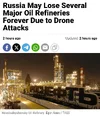In the Fuel Trail
Wholesale gasoline prices have been reaching new all-time highs since early August. The market has not yet been cooled by the government's newly introduced ban on fuel exports for large producers, while high seasonal demand and accidents at oil refineries have worsened the situation. Kommersant investigated why the current embargo has only partially worked, what is hindering the growth of gasoline production, and what independent gas stations and consumers can expect in the coming months.
Gasoline prices on the St. Petersburg Exchange began to steadily grow at the beginning of summer, accelerated sharply at the end of July, and in August, AI-95 and AI-92 quotes reached new all-time highs that had been held since the fall of 2023. Prices broke records for several days.
To stabilize the situation, the government extended the ban on gasoline exports until August 31 on July 28, extending it to producers as well. In the fall of 2023, such a measure was able to stop the rapid rise in prices, but this time the effect was insignificant. During the week of July 28 - August 1, AI-92 fell on the exchange by only 1.1%, AI-95 - by 0.4%, after which prices returned to growth due to accidents at the refineries.
On August 14, the government supported the extension of the ban on gasoline exports, including for producers, until September, and for other market participants - until October. In 2023, the effect of the embargo was shocking: the market collapsed sharply, then prices gradually recovered, recalls Maxim Dyachenko, managing partner of the trader Proleum.
Now, Mr. Dyachenko adds, due to the fact that producers and consumers have adapted, the embargo has not had a significant impact on the market.
The Ministry of Energy, together with oil companies, has also been instructed to continue balancing the market, paying special attention to the need to ensure sufficient supplies, including by increasing production, a source familiar with the results of the meeting with Deputy Prime Minister Alexander Novak told Kommersant. A Kommersant source in the industry says that large vertically integrated oil companies fulfill all their obligations to supply fuel regardless of the season. The Ministry of Energy and oil companies did not provide comments.
Factory failures
As Maksim Dyachenko notes, the key factor in the growth of quotes this summer was the unscheduled shutdowns of refineries, for which it is impossible to create a reserve in advance. According to estimates by a Kommersant source in the industry, due to scheduled repairs and incidents at refineries, gasoline production has decreased by almost 10%. If in January the average daily production of gasoline was 123.6 thousand tons, then in the first 19 days of August it decreased to 102.2 thousand tons.
Spring reserves turned out to be minimal - many independent players did not form them in advance and the market entered the season without significant reserves, the Kommersant source continues. According to him, private companies were convinced that gasoline consumption would decrease in 2025, and high interest rates on loans made stockpiling risky.
Oleg Abelev, head of the analytical department of the investment company Rikom-Trust, says that the quotes were affected by seasonal congestion of the transport infrastructure, growth in exports to Southeast Asian countries before the embargo was introduced, and high demand within the country during the holiday season.
 Mun on jotenkin ylivoimaisen vaikeeta mieltää mikä se sellainen edes mahtaisi olla.
Mun on jotenkin ylivoimaisen vaikeeta mieltää mikä se sellainen edes mahtaisi olla. Mun on jotenkin ylivoimaisen vaikeeta mieltää mikä se sellainen edes mahtaisi olla.
Mun on jotenkin ylivoimaisen vaikeeta mieltää mikä se sellainen edes mahtaisi olla.









